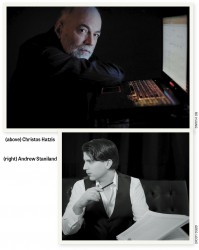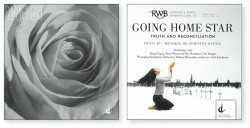For the first time in the history of Centrediscs, the small but significant record label operated by the Canadian Music Centre (CMC), two of its recent recordings have current JUNO nominations in two different categories. Dark Star Requiem by composer Andrew Staniland and poet Jill Battson is nominated in both the Best Classical Recording, Vocal or Choral and in the Best Classical Composition categories. Christos Hatzis’ full-length ballet, Going Home Star: Truth and Reconciliation, is nominated in both the Best Classical Composition and Best Classical Recording, Large Ensemble or Soloist(s) with Large Ensemble Accompaniment. This is a significant milestone for Centrediscs, a label created in 1983 by then CMC Executive Director John Miller. “The idea of Centrediscs was originally proposed by my predecessor, John Peter Lee Roberts,” Miller told me, “but it fell to me to make it work.”
Miller certainly found ingenious ways to nurture the new recording label. He formed a working group, of which I was a member, to advise on the mechanics and technical aspects of running a label. Harold Redekopp was Head of CBC Radio Music at the time and he and Miller agreed that the Radio Music Department would, up to a practical limit, provide production and technical personnel to make the recordings. And, in return for doing so, CBC music programs would have the right of first broadcast. This arrangement provided Two New Hours, the national network new music program I had created in 1978, additional new productions of recent performances of Canadian music to blend with the concert recordings that were the core of our broadcasts. In those first few years of Centrediscs we recorded soloists and ensembles who specialized in contemporary repertoire, like the Canadian Electronic Ensemble, clarinetist James Campbell, the Purcell String Quartet, violist Rivka Golani and Anton Kubalek. We made LPs of these artists playing the works of CMC Associate Composers, and soon added the first records devoted entirely to the music of a single Canadian composer. These included titles such as Vivier, music of Claude Vivier; RA, with excerpts of Murray Schafer’s night-long ritual; Louis Riel, the opera by Harry Somers, recorded at the Kennedy Center in Washington DC; and Chalumeau, chamber music of Harry Freedman. Many of these were later reissued on CD, and those original LPs are, in fact, now highly valued collectibles.
In 1986, Centrediscs released its first recording on CD, Impact, a production of performances by percussionist Beverley Johnston. In fact, Impact was manufactured in three media: CD, LP and audio cassette. The composers represented on it were Serge Arcuri, Gary Kulesha, Alexina Louie and Jean Piché, and the disc attracted rave reviews. In the Centrediscs catalogue, Impact is described as: “A tour de force of percussion and electroacoustic music, the disc has often been used by stereo component stores to demo new hi-fi lines, because of the high audiophile quality of the recording.” The performances were included more than a few times in Two New Hours programming and, on occasion, Jean Piché’s Steal the Thunder, the lead track in the album, served as the program’s opening theme. In 1989 the CMC decided to submit one of the tracks from Impact to the JUNOs in the recently created category of Best Classical Composition. It earned a nomination but didn’t win the JUNO. – Alexina Louie’s Songs of Paradise on CBC Records did. It was a remarkable statement as to how far the Centrediscs label had come in just a few years.
The JUNO category, Best Classical Composition, introduced in 1987, came about when representatives of classical labels, who formed a separate classical committee within the Canadian Academy of Recording Arts and Sciences (CARAS), convinced CARAS that the category was needed to more completely represent the spectrum of music in Canada. Deborah MacCallum, hired by Harold Redekopp as manager of CBC Records in 1985, and Norman Miller of CBS Records Canada were the primary voices pushing for the creation of this new category. MacCallum told me that Daisy Falle, president of CARAS, wanted assurance that the category was sustainable. MacCallum needed only to point out the collaboration between Two New Hours and Centrediscs as evidence that the production of contemporary Canadian repertoire had increased and that this had strengthened the storehouse of recordings in this category. Interestingly enough, the very first JUNO for Classical Composition, awarded in 1987, went to the late Malcolm Forsyth, for his orchestral work, Atayoskewin, on CBC Records.
Centrediscs recordings continued to garner nominations in the new classical composition category, year after year. It wasn’t until 1991 that the CMC’s label would actually win a JUNO when Schafer Five, the Orford String Quartet performing five string quartets by Murray Schafer won not one, but two JUNOS: Best Canadian Classical Composition for Schafer’s String Quartet No. 5, and also Best Canadian Chamber Music recording for the set of five Schafer quartets. It was a rewarding way to finally break into the winners’ circle! And in fact, in this case, the recording was independently produced by the CMC, as the collaborative arrangement with CBC Radio Music had by then expired. Nonetheless, it was the same team, but working outside the CBC, of David “Stretch” Quinney and me who delivered the finished master to the CMC.
Another of my independent productions for Centrediscs won the Best Classical Composition JUNO in 2011, and this time it was another Schafer work, his Duo for Violin and Piano, in a recording with Duo Concertante, the husband and wife team of Nancy Dahn, violin, and Timothy Steeves, piano. The recording was produced at Glenn Gould Studio with engineer Dennis Patterson. In fact it was Schafer’s fourth JUNO in the Best Classical Composition category and his fifth overall. Schafer has won the most JUNOS to date in the classical composition category.
Centrediscs’ most recent JUNO came in 2012, when Patterson and I recorded the St. Lawrence String Quartet during their 20th anniversary tour. To celebrate the anniversary, the St. Lawrence commissioned five Canadian composers from different regions of Canada to create five new quartets which constituted their 2012 touring program. The live recording, made at the University of Toronto for broadcast on CBC Radio 2’s Sunday afternoon network classical music program, In Concert, was leased by Centrediscs from the CBC and mastered for CD release. Of the five newly commissioned string quartets, it was Nova Scotia composer Derek Charke’s Sepia Fragments that won the Best Classical Composition JUNO.
 In a curious coincidence harkening back to 1987, when CBC’s Deborah MacCallum and CBS’ Norman Miller championed the addition of the Best Classical Composition category, another classical category was also added that year: that of Best Classical Recording, Vocal or Choral. These two additions 30 years ago made it possible for Dark Star Requiem, by composer Andrew Staniland and poet Jill Battson to earn nominations in both those categories in 2017. Commissioned by the Luminato Festival and Tapestry New Opera, it premiered at the Luminato festival in 2010 at Koerner Hall, Toronto. Recording Engineer Steve Sweeney and I recorded Dark Star Requiem for broadcast on CBC Radio 2’s The Signal. The CMC subsequently leased the master from CBC Radio Archives for release on Centrediscs.
In a curious coincidence harkening back to 1987, when CBC’s Deborah MacCallum and CBS’ Norman Miller championed the addition of the Best Classical Composition category, another classical category was also added that year: that of Best Classical Recording, Vocal or Choral. These two additions 30 years ago made it possible for Dark Star Requiem, by composer Andrew Staniland and poet Jill Battson to earn nominations in both those categories in 2017. Commissioned by the Luminato Festival and Tapestry New Opera, it premiered at the Luminato festival in 2010 at Koerner Hall, Toronto. Recording Engineer Steve Sweeney and I recorded Dark Star Requiem for broadcast on CBC Radio 2’s The Signal. The CMC subsequently leased the master from CBC Radio Archives for release on Centrediscs.
Composer Staniland explains the piece as follows: “Jill and I had the very best of circumstances to develop this work: take four incredible singers (Neema Bickersteth, Krisztina Szabó, Peter McGillivray, Marcus Nance), Canada’s foremost chamber ensemble, The Gryphon Trio, the legendary Elmer Iseler Singers, and percussionists Ryan Scott and Mark Duggan. Add a lengthy and meticulous development process spearheaded by Tapestry New Opera, and a premiere that would open Luminato, a world-class international festival. Such a constellation of circumstances is quite special. I am thrilled to be able to share this remarkable live recording through this release on Centrediscs.
“Dark Star Requiem is in every way my most ambitious artistic endeavour to date. It is at once intended to be challenging and joyous, complex and beautiful. A sequence of 19 poems charting a short history of HIV/AIDS unfolds over the course of 14 movements. The poems vary stylistically from linked haikus, to ghazals, to praise poems and back to free verse. The musical movements are unified through a haunting melody and driving rhythm derived from the numbers attributed to HIV-1 and HIV-2 by the International Committee on Taxonomy of Viruses: 00.061.1.06.009. and 00.061.1.06.010. In musical terms these numbers are interpreted in both melody and rhythm.
“It is difficult, from an artistic point of view, to approach a subject as multifaceted as AIDS with its myriad attendant themes including disinformation, illness, death, infection, sexual and social taboos, colonialism, fear and guilt – and still maintain a message of hope. My and Jill’s hope is that after listening to Dark Star Requiem you will leave inspired to contribute to the fight against AIDS in your own way. AIDS, despite outliving its own media fatigue, has killed over 25 million people. Forty million people worldwide live with the disease today.”
David Jaeger is a composer, producer and broadcaster based in Toronto.




